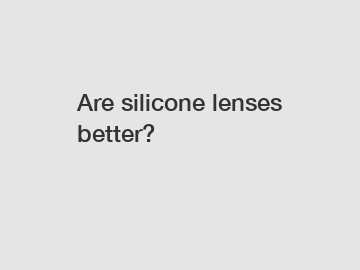Are silicone lenses better?
When it comes to your eyesight, you deserve the best. Whether you are a long-time contact lens wearer or considering switching from glasses, the sight-altering power of silicone lenses may have captured your attention. But are silicone lenses truly better than their traditional counterparts? Let's dive into the fascinating world of contact lenses and explore the advantages and drawbacks of silicone lenses.
Understanding Silicone Lenses:
Silicone hydrogel lenses, often referred to as silicone lenses, emerged as revolutionary products in the contact lens industry. Traditionally, contact lenses were predominantly made of hydrogel, a polymer with excellent water-retaining properties. However, silicone hydrogel lenses incorporate both hydrogel and silicone into their composite material, creating a new level of functionality.

The Upsides of Silicone Lenses:
1. Enhanced Oxygen Permeability: One of the key advantages of silicone lenses is their impressive oxygen permeability, which allows for a healthier and more comfortable wearing experience. These lenses enable a greater flow of oxygen through the cornea, minimizing the risk of eye infections, corneal edema, and redness commonly associated with lesser breathable lenses.
2. Extended Wear Possibilities: Silicone lenses are designed to be worn continuously for longer periods, even overnight. The enhanced oxygen transmission capabilities of silicone hydrogel allow your eyes to breathe throughout the night without compromising comfort or eye health. However, it is important to consult your eye care professional to determine if extended wear is suitable for you.
3. Increased Moisture Retention: Silicone lenses retain moisture significantly better than traditional hydrogel lenses, ensuring a comfortable and hydrated feeling for hours on end. This feature is particularly beneficial for individuals suffering from dry eyes or those who spend long hours in front of digital screens.
4. UV Protection: Many silicone lenses provide built-in ultraviolet (UV) protection, shielding your eyes from harmful sunrays. While this is not a substitute for sunglasses, the added layer of protection helps reduce the cumulative UV damage that can contribute to the development of cataracts and other eye conditions.
The Downsides of Silicone Lenses:
1. Limited Flexibility: Due to their rigidity and firmness, silicone lenses can be less flexible compared to conventional hydrogel lenses. This may pose challenges for certain individuals, especially those with astigmatism or complex prescriptions. It is essential to consult with your eye care professional to ensure the lens type suits your specific needs.
2. Higher Cost: Silicone lenses, with their advanced engineering and specialized materials, tend to be pricier than traditional hydrogel lenses. This cost difference can be a drawback for individuals on a tight budget. However, the benefits they offer may justify the investment for some individuals seeking optimal eye health and comfort.
3. Increased Deposits: Some wearers have reported higher deposition levels on silicone lenses, resulting in reduced clarity and increased discomfort. Regular cleaning and proper lens care are crucial to ensuring optimal vision and comfort. Discuss with your eye care professional the best cleaning regimen for your silicone lenses to minimize such risks.
The Final Verdict:
In the debate of whether silicone lenses are better, it is important to remember that each wearer's eyes are unique, and preferences can differ. For those who prioritize breathability, extended wear, and moisture retention, silicone lenses undoubtedly offer noticeable advantages. However, individuals with specific eye conditions or those seeking more flexibility may find traditional hydrogel lenses more suitable.
Ultimately, the decision should be made in consultation with your eye care professional, who can assess your needs, lifestyle, and ocular health. They are in the best position to determine whether silicone lenses align with your vision needs and guide you to the most appropriate choice for your eyes.
Conclusion:
Silicone lenses, with their enhanced oxygen permeability, extended wear capabilities, moisture retention, and UV protection, have revolutionized the world of contact lenses. However, it is vital to weigh the advantages against potential drawbacks such as limited flexibility and higher cost. By considering your personal needs and seeking expert advice, you can make an informed choice regarding whether silicone lenses are truly better for you.
Remember, your eyes deserve the utmost care, so make sure to prioritize your ocular health and enjoy the world of clear vision and comfortable wear that contact lenses provide.
If you are looking for more details, kindly visit dispensing closure, dispensing closure, dispensing closure.

Comments
0